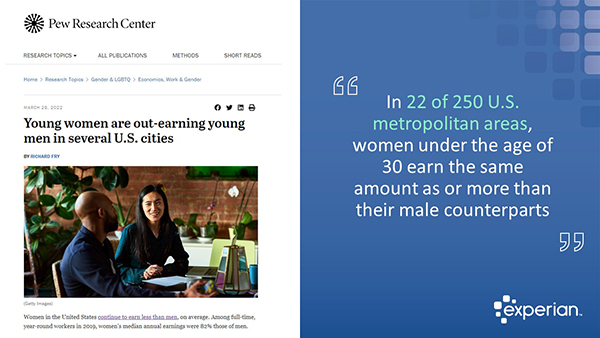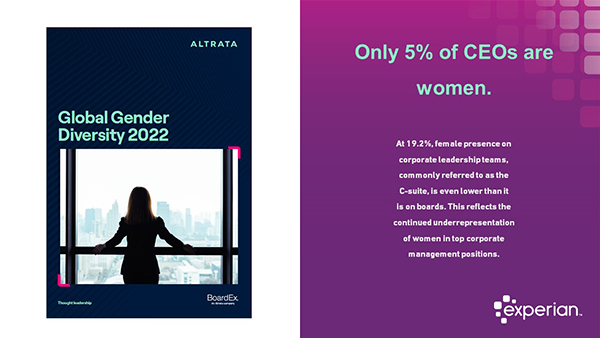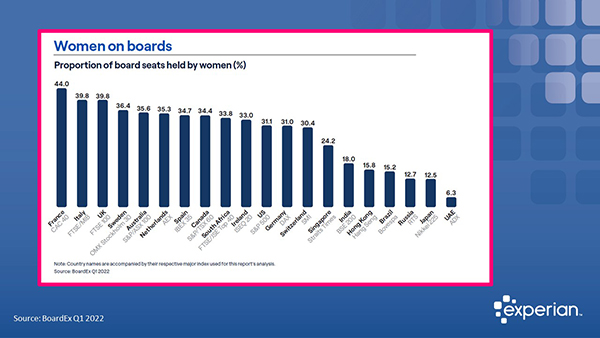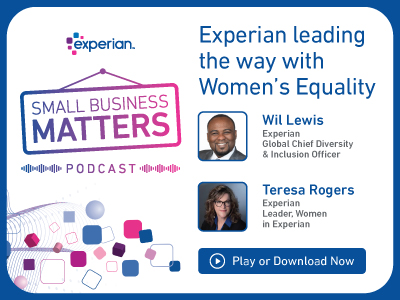Watch our interview with Luann Abrams
Subscribe To Our YouTube Channel
As we approach Women’s Equality Day on Friday, August 26th, it’s worth noting how far women have come regarding legal rights. For example, did you know that before 1974, it was illegal for women to obtain separate credit cards without their spouse’s signature? Of course, all of that changed with the passage of the Equal Credit Opportunity Act. But it doesn’t seem that long ago.
In 2020, we elected our current Vice President, Kamala Harris. And this year, we swore in our first black female Supreme Court justice Ketanji Brown-Jackson. So women are making progress, but there’s still inequality regarding women CEOs and board representation. So in this interview, we talk about women’s equality with Luann Abrams.
Luann is the founder of CEOX and a partner at FoundersPad, an early-stage venture fund with a dedicated mentorship program in Bend, Oregon. She brings some of the brightest upcoming entrepreneurs together with the most experienced business minds to drive innovation in the region. Luann’s background is in aerospace engineering, where she spent most of her 15 years in aviation working for a startup aircraft company.
What follows is a lightly edited transcription of our conversation.
Gary Stockton: So, can you tell us a little about your company’s mission and what experiences inspired you to start the company?
Luann Abrams: Yeah, I started CEOX to get more women into CEO roles. I had been working in venture capital, as you had mentioned, and really found venture to be broken for women on many different levels.
There are not enough women at venture funds deciding where the money goes; women-led companies are getting about 2.2% of the venture funds going out. And then this issue that I’m solving is not uncommon for founding CEOs to be replaced through the growth cycle of their companies. And they’re usually replaced by the venture fund themselves. It doesn’t happen every day, but it happens from time to time and every time I watched it happen. It was a man given that role, including when it was a women’s healthcare platform for tracking your fertility. And when they put a man in that role, that was just my moment of, I got to fix this because I’m not happy watching this happen repeatedly.
And so, the idea with CEOX is to pre-identify high-level executive women who could lead these startup companies to success as a CEO. So to date, we have about 700 women in the network. we’re industry agnostic. We’ve placed several CEOs, COOs, and board members throughout the past two and a half years I’ve been doing this.
Gary Stockton: It’s very important work, and very timely considering everything that’s going on with women’s rights. One piece of research that I found interesting was a Pew Research Center finding that the wage gap is closing in 22 metropolitan areas. There was also a recent pay discrimination settlement with the US Women’s Soccer Team, who will now be paid the same as the men’s team.

Do you see women filling more CEO roles and taking board positions as strictly a business challenge? Or is it, is it part of the original struggle for equal rights?
Luann Abrams: Well, it is a huge business problem. It’s a huge economic problem not to have more women running companies. Women-led companies grow faster, generate more revenue, and have higher stock prices. They exit on average a year earlier. And so, from an economic standpoint, it’s crucial to have more female CEOs. But women-led companies also have happier employees. So imagine a world with happier employees, the productivity that comes from that also has a more diverse employee base, and diversity within companies benefits the bottom line.
More diversity means solving more problems for more people, which means more money. So the economic and business challenge is real. That isn’t to say it’s not also about equal rights. But, it is, we have to recognize that women have many additional barriers to their success. Even in my career, I was not given a raise once because my boss told me my partner made plenty of money.
Luann Abrams: And, as a counterpoint to that slide you shared from Pew Research, the education department just released data showing pay disparity between men and women college graduates begin to show up within three years of graduation. Another post-COVID study showed that the gender pay gap among top executives at the S & P 500 grew to its widest since 2012.
So there are still huge barriers that women are facing in business. And yeah, it’s absolutely an equal rights issue.
Gary Stockton: Yeah. Well, Experian North America has just promoted Jennifer Schulz to North America CEO, we have a woman CEO here, and everybody is super excited to have her leading us. You’ve worked with a significant number of women. So what is it that makes women such good leaders?
Luann Abrams: Yeah, go Jennifer Schulz and go Experian, because that’s great. I love hearing that. So Harvard Business Review has done a study showing that women score better on 17 of the 19 top leadership skills that make a great CEO.
If I could sum it up, it comes down to the fact that most women lead with empathy and have dismissed the command and control leadership style that was once in Vogue, and they lead with curiosity and collaboration. They don’t walk into a room thinking they know all the answers and are just there to tell everyone what to do.
They walk in asking, what do you think? And it allows for better solutions to come to the table. It makes people feel valued. There’s also a misnomer that women aren’t risk takers. I like to talk about that a lot. They are risk takers. It’s just that the risks they end up taking seem less risky because they thought it through so well. And they baked in contingencies and alternate plans. So I could go on and on honestly all day; I don’t think you have time to go through all of the reasons women make great leaders. I believe there are many things we can learn from women, and it doesn’t mean men can’t make great leaders, but there’s a lot that we can learn from women on leadership.
Gary Stockton: I can attest to many of the attributes you mentioned there just in Jennifer’s short time as CEO for North America and other women I’ve worked for. As you said, they are very collaborative, have a high sense of curiosity, and are excellent at brainstorming. We need to encourage more of it.
Altrata’s latest Global Gender Diversity Report contains some interesting insights on gender equality. Specifically, France leads the G20 in terms of women on boards with 44%, while the US S&P 500 has 31.1% women board members; the US number has been growing, but why do you think it’s so challenging to increase this number?

Luann Abrams: Well, I think it’s because people continue to hire for experience over actual talent. And this happens at all levels, not just at the board and executive levels. It occurs from the very early stages in people’s careers. So for women, particularly, they have to show that they can do something before they’re hired, which presents a vast catch-22, regarding public boards.

The boards usually seek someone with public board experience, but how do women get that first public board role? Men are hired on potential all of the time. It’s a well-documented bias area where men are hired on potential. Women are hired for what they’ve accomplished. So it’s just a lot easier for men to get that experience that is required to get on a board. There are many, many talented women and people of color out there. They have what it takes, but they’re not going to be selected because they’re being hired based on their experience and qualifications. So really, it’s critical to hire based on talent and assess talent. And it’s the key to changing that number, I believe.
Gary Stockton: Do you think women leaders too often settle for number two positions? And, and if so, what do you think is behind that?
Luann Abrams: I do. I think that women will often come to me saying I would make a great number two, but I am not probably CEO material. One conversation with me and I’ll change their mind I promise. So first, I think it’s important for women to understand there’s no magic fairy dust that gets waved on a CEO that makes him great. If you have the skills and leadership ability to be a CEO, you can be a CEO. Second, I think some women fear that CEO roles will be all-consuming and could be very detrimental to their families. I think that’s a valid concern, but also one that leads to why we desperately need more women CEOs. Because we need more flexibility in work, it makes for better human beings. It makes for better family structures. It makes a better business culture more inclusive in that way.
And so we need more women leading companies and creating that culture at the company because that really benefits everyone.
Gary Stockton: If someone has ambitions to be a woman CEO or board member one day, what things should they do early on in their career to put themselves on the right trajectory?
Luann Abrams: Well, first of all, just having it on your list of things you want to accomplish is probably the first step. So, you know, talking to young women about being a CEO and making sure that’s in their career path and trajectory is vital because if you don’t think about it, you’re probably not going to navigate your career that way actively.
I would say one is networking. Even if you’re a massive introvert like me, network, network, network, most jobs are found through people’s networks. And so, make sure you’re in people’s networks at the highest levels. And then really finding that sponsor, not a mentor, but a sponsor. A sponsor is someone who’s going to say your name in rooms where the power is, and it’s a big deal to have someone like that who can advocate for you. So being deliberate about finding that person, talking to them, and being receptive to their feedback on how you can improve as a business person is probably the number one thing you can do.
Gary Stockton: Excellent advice. According to Altrata’s Global Gender Diversity report, 11 countries in the G20 have quotas for women on boards. Is that something that you see happening here in the United States?
Luann Abrams: So it was happening. California had some very progressive laws on ensuring that public companies based in California had at least 20% women on the board, and unfortunately, those laws are blocked right now. We’ll see how that plays out. I know other states were looking at following that. I am a fan. I hate having to have it, but it does force change. And economically speaking that change is very positive. You know, you’re going to have more successful companies, the more diverse they are. There are also organizations in the US taking a stand on board diversity; you’ve got Goldman Sachs and NASDAQ saying they won’t take companies public without having a diverse board.
And those are critical. I am a little hesitant to get behind them and see how they play out because there are many loopholes and caveats to that. But, if they have a good explanation of why they don’t have a diverse board, they can get through that and get around it, and quite frankly, since VCs have backed most companies that become public. Most VCs are white men, which means their boards are full of white men. And, so it’s very easy to claim, well, our investors on our board and our investors happen to be all white men. But that’s why you know; if that is how people get around this rule, then they really aren’t going to have any effect.
Gary Stockton: So what advice would you give to women about negotiating salary for their next position?
Luann Abrams: Do negotiate; that’s probably the piece of advice. You will get an offer and need to negotiate that offer. Don’t accept it. Don’t accept the first offer. Ask for an amount that will make you feel uncomfortable. It’s doubtful they will rescind an offer because you’ve asked for too much money. The most likely scenario is they will come back with a counter offer somewhere between. And that’s one that you can consider taking, and that part of the pay gap problem is that even early in our careers, we’re not negotiating that first paycheck, and that often will follow us for our whole lives. So it’s important to negotiate. There’s lots of information on learning how to negotiate, but it’s as simple as asking for more.
Gary Stockton: Any closing thoughts on Women’s Equality Day and how you will celebrate this year?
Luann Abrams: Well, every day is Women’s Equality Day in my world, and that is the truth. I work every day to try and elevate women, and so I will celebrate it by continuing to do what I do and advocate for women.
Gary Stockton: That’s awesome Luann, it’s been an illuminating discussion. You have given us a lot to think about here. Tell our listeners where to learn more about CEOX and how to best engage with your organization.
Luann Abrams: Yeah, you can go to our website, projectceox.com. There is a place you can contact us. There’s a place where if you are a senior leader and want to nominate women to the CEOX community who are ready to be CEOs, you can do that there. And that is probably the best way. We also have events that you are welcome to attend, and we have a resource area for aspiring CEOs to access and get some great content that we in the CEOX community have gone through and found helpful.
Watch our interview with Wil Lewis & Teresa Rogers

